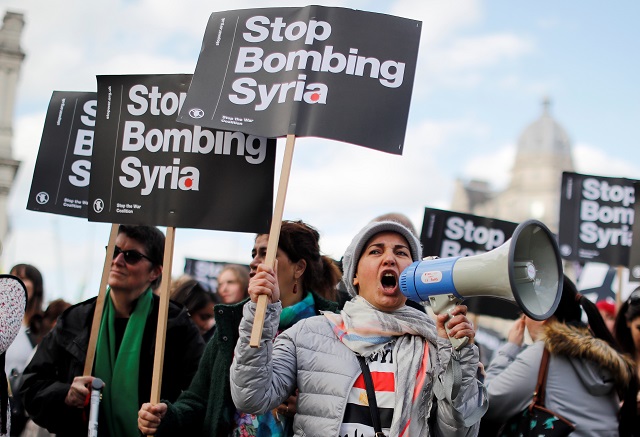
There are serious legal and strategic concerns regarding the decision by the United States, along with France and Great Britain, to bomb Syria in response to its alleged use of chemical weapons in Douma. Even if one considers the April 13 airstrikes on a series of targets in two Syrian cities to be legitimate, it would be naïve to assume that Western powers conducted the bombing out of any sincere moral concern about Syria’s apparent use of these horrific banned substances.
To begin with, conventional ordnance provided by the United States, France and Britain to the armed forces of Saudi Arabia, Israel, Turkey, Iraq and other allied governments have killed many times more civilians than those who have died from chemical attacks in Syria. While, both legally and historically, there is indeed a qualitative difference between chemical and conventional weapons, the use of any ordnance on civilian targets is illegal under international law and is a moral outrage.
Regarding the specific use of chemical weapons, however, the reaction by the United States government nations has been inconsistent.
It was the Iraqi regime of Saddam Hussein, during the Iran-Iraq War in the 1980s, that used chemical weapons on a scale far greater than any country had dared since the weapons were banned 95 years ago. The Iraqis inflicted close to 100,000 casualties among Iranian soldiers using banned chemical agents, resulting in 20,000 deaths and tens of thousands of long-term injuries.
They were unable to do this alone, however. Despite ongoing Iraqi support for Abu Nidal and other terrorist groups during the 1980s, the Reagan administration removed Iraq from the State Department’s list of state sponsors of terrorism in order to provide the regime with thiodiglycol, a key component in the manufacture of mustard gas and other chemical precursors for their weapons program.
Walter Lang, a senior official with the US Defense Intelligence Agency (DIA), noted how “the use of gas on the battlefield by the Iraqis was not a matter of deep strategic concern” to President Reagan and other administration officials since they “were desperate to make sure that Iraq did not lose.” Lang noted that the DIA believed Iraq’s use of the chemical was “seen as inevitable in the Iraqi struggle for survival.” In fact, DIA personnel were dispatched to Baghdad during the war to provide Hussein’s regime with US satellite data on the location of Iranian troop concentrations in full knowledge that the Iraqis were using chemical weapons against them.
Even the Iraqi regime’s use of chemical weapons against civilians was not seen by the US as particularly problematic. The March 1988 massacre in the northern Iraqi city of Halabja, where Hussein’s forces murdered up to 5,000 Kurdish civilians with chemical weapons, was downplayed by the Reagan administration, with some officials even falsely claiming that Iran was actually responsible. The United States continued sending aid to Iraq even after the regime’s use of poison gas was confirmed.
When a 1988 Senate Foreign Relations committee staff report brought to light Hussein’s policy of widespread extermination in Iraqi Kurdistan, Sen. Claiborne Pell introduced the Prevention of Genocide Act to put pressure on the Iraqi regime, but the Bush administration successfully moved to have the measure killed. This came despite evidence emerging from UN reports in 1986 and 1987, prior to the Halabja tragedy, documenting Iraq’s use of chemical weapons against Kurdish civilians — allegations that were confirmed both by investigations from the CIA and from US embassy staff who had visited Iraqi Kurdish refugees in Turkey.
However, not only was the United States not particularly concerned about Iraq’s use of chemical weapons, the Reagan administration also continued supporting the Iraqi government’s procurement effort of materials necessary for their development.
Ironically, long after Iraq had rid itself of these banned weapons, US politicians of both parties retroactively used the Hallabja massacre as a rationalization for the US invasion and occupation of Iraq 15 years later.
Given the US culpability in the deaths of tens of thousands of people by Iraqi chemical weapons barely 30 years ago, even many of Syrian dictator Bashar al-Assad’s fiercest opponents have to question US motivations. Indeed, the United States blocked efforts by the United Nations Security Council and the Syrian government itself to establish a region-wide ban on chemical weapons prior to the outbreak of the civil war, which may have very well prevented the subsequent attacks.
It should also be noted that the first country to use chemical weapons in the Middle East was Great Britain in 1920, as part of its efforts to put down a rebellion by Iraqi tribal leaders when British forces seized the country following the collapse of the Ottoman Empire. Indeed Winston Churchill, who then held the position of Britain’s secretary of state for war and air, said: “I do not understand this squeamishness about the use of gas. I am strongly in favour of using poisonous gas against uncivilised tribes.”
None of this should minimize the horror of what the Assad regime has unleashed upon the Syrian people with both its chemical and conventional weapons, nor does it mean that the United States and other Western nations should be complacent in the face of such serious war crimes. At the same time, in addition to questions about the legitimacy and efficacy of the recent attacks on Syria by the United States and its allies, this history makes it difficult for the United States and its allies to take the moral high ground.
Press freedom is under attack
As Trump cracks down on political speech, independent media is increasingly necessary.
Truthout produces reporting you won’t see in the mainstream: journalism from the frontlines of global conflict, interviews with grassroots movement leaders, high-quality legal analysis and more.
Our work is possible thanks to reader support. Help Truthout catalyze change and social justice — make a tax-deductible monthly or one-time donation today.